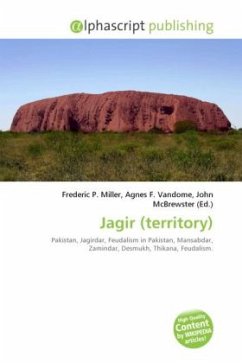
Jagir (territory)
Versandkostenfrei!
Versandfertig in 6-10 Tagen
26,99 €
inkl. MwSt.

PAYBACK Punkte
13 °P sammeln!
High Quality Content by WIKIPEDIA articles! In Pakistan and India, a Jagir was a small territory granted by the ruler to an army chieftain in fairly short terms usually of three years but not extending beyond his lifetime, in recognition of his military service. The grantee of the jagir, called a Jagirdar, was in effect the ruler of that region and substantial income that was earned (taxes, etc.) from this region went to the owner to maintain his family and his troops. The jagirdar would live at court in Delhi, keeping up his rank and appearing twice a day before the emperor; consequently the ...
High Quality Content by WIKIPEDIA articles! In Pakistan and India, a Jagir was a small territory granted by the ruler to an army chieftain in fairly short terms usually of three years but not extending beyond his lifetime, in recognition of his military service. The grantee of the jagir, called a Jagirdar, was in effect the ruler of that region and substantial income that was earned (taxes, etc.) from this region went to the owner to maintain his family and his troops. The jagirdar would live at court in Delhi, keeping up his rank and appearing twice a day before the emperor; consequently the jagirdar preferred to receive his share of the dues from the estates in coin rather than in kind. Jagir as per law was a grant made by the Ruler was only for the lifetime of the grantee. On the death of the grantee, the grant reverted to the Ruler and it was in the sole discretion of the Ruler either to re-grant it, or not. It was open to the Ruler to re-grant it to the heirs and successors of the previous grantee, or to one or more of them, or to total stranger. The Jagirs were in practice hereditary.












